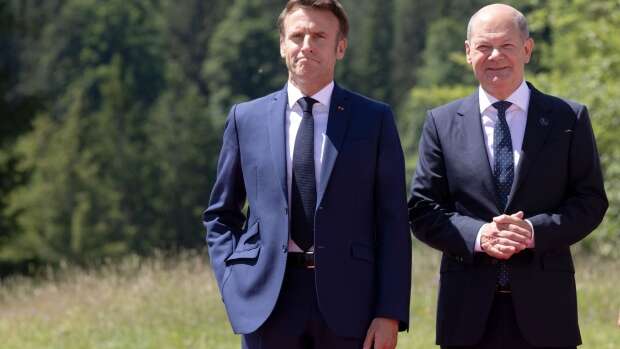Germany and France warned that European businesses will need to unleash investments on a nearly unparalleled scale to keep from falling behind US and Chinese firms as countries revamp their economies to make them more climate-friendly, according to Bloomberg.
German Chancellor Olaf Scholz and French President Emmanuel Macron met in Paris Sunday to discuss how the European Union should respond to President Joe Biden’s Inflation Reduction Act, which includes roughly $500 billion in new spending and tax breaks over a decade to benefit US companies.
The EU argues that the law, which came into effect this year, doesn’t comply with international rules and would unfairly entice companies to shift investments to the US from Europe. The bloc’s leaders will meet next month to discuss their options, one of which is to file a complaint with the World Trade Organization.
“The first thing is to make sure we as the European Union are not treated worse than immediate neighbors such as Canada and Mexico, for example — that cannot be accepted,” Scholz told a joint news conference with Macron at the Elysee palace, adding that the US has signaled “great understanding” on this point. “I’m currently very confident we’ll reach a necessary understanding during the first part of the year.”
Macron added: “We have a real convergence on the responses we’re bringing.”
The US law will subsidize energies of the future, from hydrogen to batteries, wind and solar, and will aim to make manufacturing self-reliant and to ensure the country isn’t dependent on China or other nations.
Germany and France have urged the US to tweak the law to give European companies more flexibility to take advantage of the credits being offered. But officials in the EU have been growing skeptical that Washington will make meaningful changes and have started mapping out ways to protect European industry.
The EU’s response will likely include giving member states more latitude to invest in their own companies and would redirect existing EU money to firms in need. They’ll also discuss how far-reaching any plan will be and, importantly, if it will include new money.
The EU’s competition chief Margrethe Vestager has cautioned that too much national support for companies could disadvantage smaller and poorer countries that have less fiscal capacity. Germany and France, the EU’s two largest economies, have benefited the most after the European Commission, the bloc’s executive arm, eased existing rules to help firms grapple with high energy costs.
Six countries — Denmark, Finland, Ireland, the Netherlands, Poland and Sweden — have already urged the European Commission to exercise great caution when changing the EU’s temporary crisis framework. They have warned about the risk of fragmentation of the internal market, harmful subsidy races and weaker regional development.


